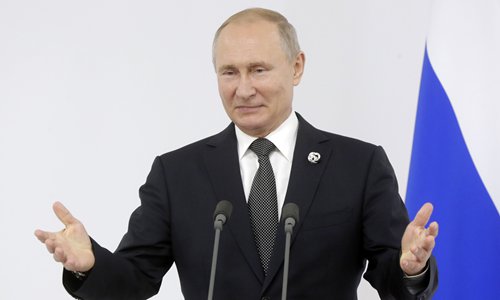HOME >> OPINION
Putin’s views on liberalism another dig at West
By Cui Heng Source:Global Times Published: 2019/7/9 20:08:41

Photo: IC
During an interview in late June with the Financial Times, Russian President Vladimir Putin said liberalism has "outlived its purpose." For those familiar with Russia's political dynamics, Putin's view is not surprising. After the disintegration of the Soviet Union, Russian elites had adhered to liberalism when rebuilding the Russian state.Since the beginning of the 21st century, liberal ideology has become weak. Now, it is a synonym for unfeasibility within Russia's political context. Liberalism has served as a reflection of Russia's political development during the past three decades, the country's choice of its future path, and its relations with Western countries.
Among Russian elites, liberalism holds two meanings. On the one hand, it guides state building. This was evident in the 1990s when political and economic reforms were carried out under the guidance of liberal ideas.
On the other hand, some Russians understand liberalism from the perspective of international order. They regard post-Cold War international order as a West-led liberal concept. In the interview, Putin warned that liberalism has become "obsolete," which is based on this perspective.
If we judge from his governing experience of nearly 20 years, we can see that Putin respects certain liberal ideas, particularly the system and constitutionalism which was already in place.
For example, without seeking a third consecutive presidential term, he adhered to the Constitution and stepped down from office in 2008 at the end of his second term.
Putin also yearned for the post-Cold War liberal international order from the early days of his administration. For example, he played an active role in the G8 summit while developing ties with the US and Europe.
But as relations between Russia and the West soured in recent years, Russian mainstream elite represented by Putin began distancing themselves from liberal ideology. It was the 2008 global financial crisis that pushed Russian elite to re-examine liberalism.
From the perspective of state building, many countries at the time preferred the interventionist-led measures, which strengthened macroeconomic state intervention. Among them, Asian countries, including China, achieved notable results.
Since 2008, Russia's perspective on learning new development methods and governance from China has increased. In particular, after the Ukrainian crisis in 2014, Russian elite suggested they learn more about China's policies to strengthen macroeconomic management, establish social order, and maintain domestic stability.
It was also during this time when the Putin administration strengthened the national role of the state and preserved social order and traditional values. Conservatism has since become mainstream among Russian political ideologies.
In the international arena, Russia has been increasingly dissatisfied with the liberal order dominated by the West. It has always opposed the West's interference with the internal affairs of other countries, all in the name of human rights, advocating that liberalism should not be the sole choice for future international order.
The anti-globalization trend, manifested by Brexit and the rise of populism in the US and parts of Europe, has made Russia realize that liberal international order faces serious problems.
Some believe in Yevgeny Primakov's theory of multipolarity, holding that China, Russia, India and other powers should balance US hegemony. Some have even suggested a return to the Westphalia system, under which each major power has a strict sphere of influence and would not interfere with other countries.
Meanwhile, some believe that superpower cooperation promoted at the Congress of Vienna offers a feasible way to deal with a global crisis.
Russia has been aware that the liberal international order cannot function in today's global and economic context. However, a consensus has yet to be reached over what the future international order would be.
In his interview, Putin said that some elements of liberal ideas are "no longer tenable" in the West. The free movement of people advocated by liberalism has been replaced by anti-immigration thoughts and border blockades, while multiculturalism has had an impact on traditional values.
In contrast, and in spite of the problems Russia faces today, Putin's brand of conservatism during the last decade, which is used to strengthen the state's role, to stabilize social order and to maintain traditional values, is a response to the challenges the US and Europe face today.
Thus, Putin has a deeper understanding of the decline of liberalism.
After the Ukrainian crisis, Russian strategist Sergey Karaganov said on private occasions that Russia cannot return to what it was in the 1990s. Liberalism was a long-awaited goal for Russia, but has finally lost its influence. Putin's view on liberalism is indeed a reflection of the general understanding among Russian elite.
The author is a post-doctorate researcher from the Centre for Russian Studies, East China Normal University. opinion@globaltimes.com.cn
Posted in: VIEWPOINT